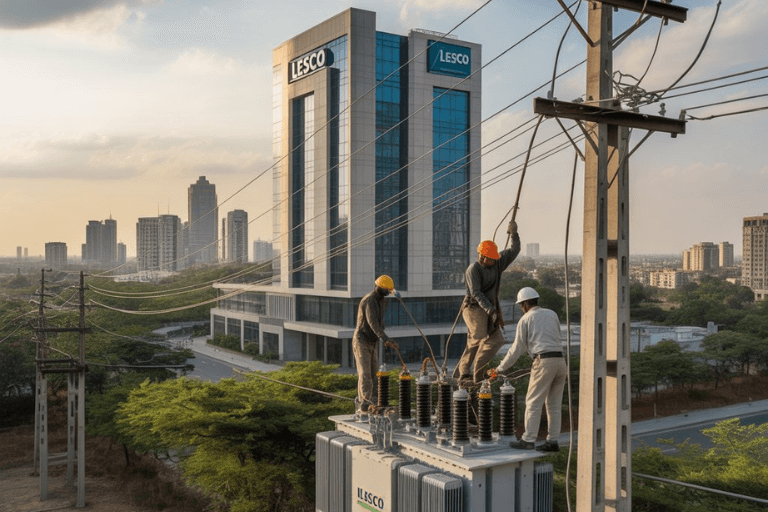Introduction
The Lahore Electric Supply Company (LESCO), one of Pakistan’s largest power distribution companies, has remained in the spotlight throughout 2025. From major infrastructure damages caused by severe weather to ongoing government privatization efforts and an intensified campaign against power theft, (Lahore Electric Supply Company) continues to play a crucial role in the country’s power sector reforms. Despite ongoing hurdles, the company’s performance and initiatives demonstrate its commitment to providing reliable electricity to millions of consumers across Lahore, Kasur, Okara, Sheikhupura, and Nankana Sahib.
LESCO Faces Major Outage After Windstorm
In early October 2025, a powerful windstorm and heavy rain struck Lahore and surrounding districts, leading to the collapse of several transmission lines and transformers. The storm uprooted trees and damaged high-voltage cables, causing electricity outages that lasted up to 18 hours in some areas.
(Lahore Electric Supply Company) Chief Executive Ramzan Butt confirmed that the company’s teams worked around the clock to restore power, despite massive damage to poles, transformers, and 132kV transmission lines. Areas such as Johar Town, Gulberg, Okara, and Kasur were among the hardest hit.
The incident exposed the vulnerability of LESCO’s overhead transmission system, prompting experts to call for a long-term shift toward underground power infrastructure. This modernization, they argue, could prevent large-scale blackouts during storms and improve reliability for millions of consumers.
Government Targets LESCO for Privatization
In September 2025, the federal government formally began the process of privatizing (Lahore Electric Supply Company) and MEPCO (Multan Electric Power Company). The Privatization Commission of Pakistan requested comprehensive audits, property records, and employee data to move the plan forward.
The initiative aims to improve efficiency, reduce financial losses, and attract private investment in the electricity distribution sector. LESCO’s management has been directed to submit updated balance sheets, asset valuations, and employee records, while ensuring transparency in financial audits.
While the privatization plan has sparked debate, many industry analysts believe it could bring technological upgrades, accountability, and better consumer service if managed responsibly. However, unions and workers have expressed concerns about potential layoffs and changes in employment benefits.
LESCO Recovers Rs750 Million in Power Theft Crackdown
Parallel to these developments, (Lahore Electric Supply Company) has launched an aggressive anti-theft campaign across its operational regions. Between July and September 2025, the company uncovered electricity theft worth more than Rs750 million, filing nearly 15,000 FIRs and recovering over Rs195 million through detection bills.
LESCO’s spokesperson emphasized the company’s zero-tolerance policy against electricity theft, conducted in collaboration with police and Rangers. So far, 219 individuals involved in illegal connections have been arrested, and over 21 million stolen electricity units have been recovered.
This crackdown aims to protect honest consumers and reduce line losses that contribute to Pakistan’s power shortfall and rising tariffs. The company has also accelerated upgrades to grid stations and transmission lines to enhance system stability.
The Road Ahead: Modernization and Accountability
LESCO’s challenges in 2026 underline the urgent need for infrastructure modernization, digital monitoring, and transparent management. As the government pushes toward privatization, the company’s focus must remain on ensuring uninterrupted power supply, consumer satisfaction, and fair billing.
The success of LESCO’s future depends on how effectively it balances technological reforms with social responsibility—ensuring that reliable electricity remains accessible and affordable for every household and business in Punjab.
Frequently Asked Questions:
What is the history of LESCO?
The Lahore Electric Supply Company (LESCO) was established in 1998 after the unbundling of the Water and Power Development Authority (WAPDA). It was created to handle the distribution and supply of electricity in Lahore and nearby districts, including Kasur, Okara, Sheikhupura, and Nankana Sahib. Over the years, LESCO has grown into one of Pakistan’s most important power distribution companies, serving over 5 million consumers. Its mission has always been to ensure safe, reliable, and affordable electricity while reducing power theft and improving system efficiency.
What is LESCO in Pakistan?
LESCO stands for Lahore Electric Supply Company, a government-owned power distribution utility operating under the Ministry of Energy (Power Division), Pakistan. It is responsible for distributing electricity to households, businesses, and industries in Lahore and surrounding regions. (Lahore Electric Supply Company) manages the billing, maintenance, and infrastructure upgrades in its service area and plays a key role in Pakistan’s national power grid. In 2025, the company is also part of a government plan for partial privatization to improve efficiency and customer service.
How to check LESCO bill?
You can easily check your (Lahore Electric Supply Company) bill online using the company’s official website:
Here’s how:
- Visit the LESCO Bill Check page.
- Enter your 14-digit reference number (found on your printed bill).
- Click “Submit” or “View Bill.”
- Your current and previous bills will appear, including due date, units consumed, and payable amount.
You can also download or print the bill and make payments online via bank apps, Easypaisa, or JazzCash.
Is LESCO owned by John Deere?
No, LESCO is not owned by John Deere. John Deere is an American agricultural machinery company, while LESCO (Lahore Electric Supply Company) is a Pakistani state-owned electricity distribution company. The confusion often arises because there was once a U.S.-based lawn care company named “LESCO, Inc.”, which was acquired by John Deere in 2007 — but that company has no relation to the Pakistani (Lahore Electric Supply Company).
LESCO in Pakistan remains under the supervision of the Government of Pakistan through the Ministry of Energy (Power Division) and the National Electric Power Regulatory Authority (NEPRA).
Conclusion
The year 2025 has been transformative for (Lahore Electric Supply Company) — marked by storms, reforms, and resilience. Whether through anti-theft operations, system restoration, or upcoming privatization, LESCO continues to power Lahore’s future. The company’s commitment to transparency, modernization, and public welfare makes it a central figure in Pakistan’s evolving energy landscape.

